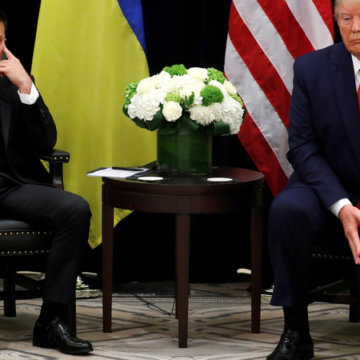- About
- Topics
- Picks
- Audio
- Story
- In-Depth
- Opinion
- News
- Donate
- Signup for our newsletterOur Editors' Best Picks.Send
Read, Debate: Engage.
| topic: | Good Governance |
|---|---|
| located: | USA, Russia, Ukraine |
| editor: | Igor Serebryany |
What does the much-anticipated transcript summary of a phone call tell of the uneasy relations between the Ukrainian President Volodymr Zelensky and Donald Trump?
At the UN news conference, the body language of the two presidents spoke volumes, observers point out. The reporters asked questions that had little to do with their recent talks but were focused entirely on the phone conversation held two months prior. The transcript of the conversation was made public by the White House the same day the Washington Post published an article claiming that Trump demanded the Ukrainian "neophyte" counterpart to speed up an investigation against Joe Biden-jr, the son of his potential opponent during the U.S. elections in 2020.
According to the newspaper, Trump made the sigging of information on Joe Biden-jr a condition of the U.S. future support to Kiev in its disputes with Russia. During the press conference in the UN on Tuesday, Zelensky insisted "no one exercised any pressure on him", and Trump eagerly agreed.
Those clumsy answers by the presidents are hard to believe, says Stanislav Byshok, Executive Director of the International monitoring organization CIS-EMO. "They behaved like two students called to the schoolmaster on suspicion that they have smoked in a restroom. It was clear that Zelensky felt unhappy with about his conversation with Trump. When Trump said that the U.S. had already done its best to support Ukraine, was this a clear hint that Kiev has to look for more support elsewhere?" Byshok adds. Elsewhere - that means in the European Union.
But the EU has swiftly been losing incentives to exercise such support, the expert continues. "This is a paradox: The more eagerly Kiev sides with the West, the less the West is willing to help Ukraine. For the European Union, Ukraine's pro-European orientation has been obvious and needs no additional evidence. So why pay more", Byshok comments.
Unlike Trump, who now faces a possible impeachment procedure over his "mafia-style pressure" on Zelensky, the Ukrainian president has little to worry about, Byshok is convinced. "In Ukraine, everything concerning the talks between Zelensky and Trump has been on the fringe of the political agenda. Everyone there understands the actual capabilities of the two leaders and no one expects Zelensky to lay down terms on Trump," he says. The only question Zelensky may have to answer back home is whether he bent under Trump's "pressure" to influence Ukraine's law enforcement institutions - that is, to take part in the domestic policy of a foreign country in exchange for that country's support in Ukraine's disputes with Moscow.
The question makes sense on the eve of the Normandy Four meeting due in October, where Zelensky might face joint opposition from Russia, France and Germany (a possibility he complained about to Trump during their conversations in July), says Vadim Karasev, head of Kiev's Institute of Global Strategy. "It is rather unusual within international relations that a leader of a country complains to a leader of another country about the leaders of other countries. Still, Angela Merkel and Emmanuel Macron make their political decisions on the base of their respective national interests and not personal offences", he stresses.
Earlier in September, France and Germany advised Zelensky to agree with Putin's terms, based on that, peace must be sustained at any price. Those opinions caused deep mistrust in Kiev.
Karasev is certain that the publication of the phone conversations between Zelensky and Trump will have repercussions only in the U.S. domestic political battles and negligibly little for Ukraine. Kiev has a weak position during the upcoming talks with the Russian, German and French counterparts unless Zelensky feels support by the U.S. At the moment, Trump definitely does not do so, Pavlo Grod, chairman of the World Ukrainians Congress, says. "Putin wants to control Ukraine through his agents of influence in the country's power structures, otherwise he looks forward to rendering Ukraine a failed state", Grod says.
Photo: AP
